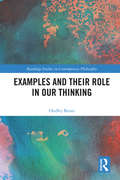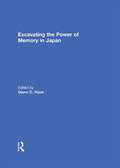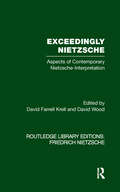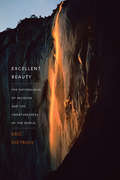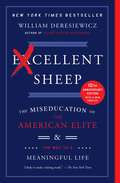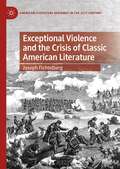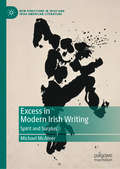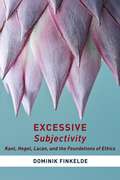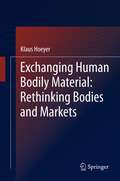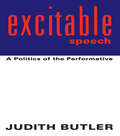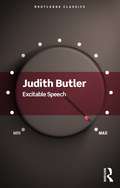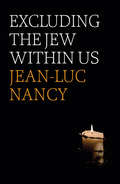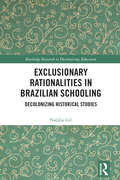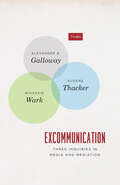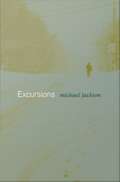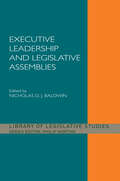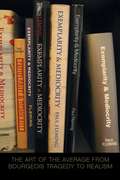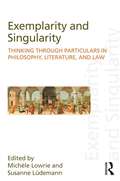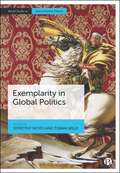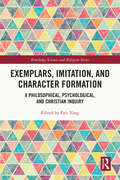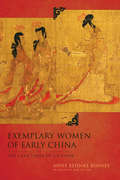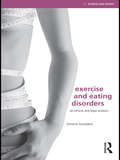- Table View
- List View
Examples and Their Role in Our Thinking (Routledge Studies in Contemporary Philosophy)
by Ondřej BeranThis book investigates the role and significance that examples play in shaping arguments and thought, both in philosophy and in everyday life. It addresses questions about how our moral thinking is informed by our conceptual practices, especially in ways related to the relationship between ethics and literature, post-Wittgensteinian ethics, or meta-philosophical concerns about the style of philosophical writing. Written in an accessible and non-technical style, the book uses examples from real-life events or pieces of well-known fictional stories to introduce its discussions. In doing so, it demonstrates the complex way examples, rather than exemplifying philosophical points, inform and condition how we approach the points for which we want to argue. The author shows how examples guide or block our understanding in certain directions, how they do this by stressing morally relevant aspects or dimensions of the terms, and how the sense of moral seriousness allows us to learn from examples. The final chapter explores whether these kinds of engagement with examples can be understood as "thinking primarily through examples." Examples and Their Role in Our Thinking will be of interest to scholars and graduate students working in ethics and moral philosophy, philosophy of language, and philosophy of literature.
Excavating the Power of Memory in Japan
by Glenn D. HookExcavating the power of memory offers a succinct examination of how memory is constructed, embedded and disseminated in contemporary Japanese society. The unique range and perspective of this collection will provide an understanding not found elsewhere. It starts with a lucid introduction of how memory plays a political and wider social role in Japan. Four case studies follow. The first takes up the divergence in memory at the national and subnational levels by analysing the memory of the battle of Okinawa and US military accidents in Okinawa prefecture, illuminating how memory in the prefecture embeds Okinawans as victims of mainland Japan and of the United States. The second explores whether Japan’s membership of the International Criminal Court represents a shift in the Japanese government’s negative remembrance of the International Military Tribunal for the Far East, demonstrating how both courts are largely portrayed as being disconnected in political debates. The third offers an analysis of the surviving letters of the Kamikaze pilots in order to interrogate and compare their presumed identity in the dominant collective memory and their own self-identities. The fourth untangles how the ‘memory of winds’ in Japanese fishing communities remains an expression of social thought that presides over the ‘transmission of meaning’ about fishermen's geographical surroundings. This book was previously published as a special issue of the Japan Forum.
Exceedingly Nietzsche: Aspects of Contemporary Nietzsche Interpretation
by David Farrell KrellOriginally published in 1988, this collection brings together a wide range of original readings on Friedrich Nietzsche, reflecting many aspects of Neitzsche in contemporary philosophy, literature and the social sciences. The Nietzsche these contributors discuss is the Nietzsche who exceeds any attempt at determinate interpretation, the Nietzsche whose capacity for renewing thought seems limitless. This is a powerful collection of essays and a major contribution to modern Nietzsche interpretation.
Excellent Beauty
by Eric DietrichFlipping convention on its head, Eric Dietrich argues that science uncovers awe-inspiring, enduring mysteries, while religion, regarded as the source for such mysteries, is a biological phenomenon. Just like spoken language, Dietrich shows that religion is an evolutionary adaptation. Science is the source of perplexing yet beautiful mysteries, however natural the search for answers may be to human existence. Excellent Beauty undoes our misconception of scientific inquiry as an executioner of beauty, making the case that science has won the battle with religion so thoroughly it can now explain why religion persists. The book also draws deep lessons for human flourishing from the very existence of scientific mysteries. It is these latter wonderful, completely public truths that constitute some strangeness in the proportion and reveal a universe worthy of awe and wonder.
Excellent Beauty: The Naturalness of Religion and the Unnaturalness of the World
by Eric DietrichFlipping convention on its head, Eric Dietrich argues that science uncovers awe-inspiring, enduring mysteries, while religion, regarded as the source for such mysteries, is a biological phenomenon. Just like spoken language, Dietrich shows that religion is an evolutionary adaptation. Science is the source of perplexing yet beautiful mysteries, however natural the search for answers may be to human existence.Excellent Beauty undoes our misconception of scientific inquiry as an executioner of beauty, making the case that science has won the battle with religion so thoroughly it can now explain why religion persists. The book also draws deep lessons for human flourishing from the very existence of scientific mysteries. It is these latter wonderful, completely public truths that constitute some strangeness in the proportion, revealing a universe worthy of awe and wonder.
Excellent Sheep: The Miseducation of the American Elite and the Way to a Meaningful Life
by William DeresiewiczA groundbreaking manifesto about what our nation&’s top schools should be—but aren&’t—providing: &“The ex-Yale professor effectively skewers elite colleges, their brainy but soulless students (those &‘sheep&’), pushy parents, and admissions mayhem&” (People).As a professor at Yale, William Deresiewicz saw something that troubled him deeply. His students, some of the nation&’s brightest minds, were adrift when it came to the big questions: how to think critically and creatively and how to find a sense of purpose. Now he argues that elite colleges are turning out conformists without a compass. Excellent Sheep takes a sharp look at the high-pressure conveyor belt that begins with parents and counselors who demand perfect grades and culminates in the skewed applications Deresiewicz saw firsthand as a member of Yale&’s admissions committee. As schools shift focus from the humanities to &“practical&” subjects like economics, students are losing the ability to think independently. It is essential, says Deresiewicz, that college be a time for self-discovery when students can establish their own values and measures of success in order to forge their own paths. He features quotes from real students and graduates he has corresponded with over the years, candidly exposing where the system is broken and offering clear solutions on how to fix it. &“Excellent Sheep is likely to make…a lasting mark….He takes aim at just about the entirety of upper-middle-class life in America….Mr. Deresiewicz&’s book is packed full of what he wants more of in American life: passionate weirdness&” (The New York Times).
Exceptional Violence and the Crisis of Classic American Literature (American Literature Readings in the 21st Century)
by Joseph FichtelbergThis book is an interdisciplinary study of antebellum American literature and the problem of political emergency. Arguing that the United States endured sustained conflicts over the nature and operation of sovereignty in the unsettled era from the Founding to the Civil War, the book presents two forms of governance: local and regional control, and national governance. The period’s states of exception arose from these clashing imperatives, creating contests over land, finance, and, above all, slavery, that drove national politics. Extensively employing the political and cultural insights of Walter Benjamin, this book surveys antebellum American writers to understand how they situated themselves and their work in relation to these episodes, specifically focusing on the experience of violence. Exploring the work of Edgar Allan Poe, ex-slave narrators like Moses Roper and Henry Bibb, Herman Melville and Emily Dickinson, the book applies some central aspects of Walter Benjamin’s literary and cultural criticism to the deep investment in pain in antebellum politics and culture.
Excess in Modern Irish Writing: Spirit and Surplus (New Directions in Irish and Irish American Literature)
by Michael McAteerThis book examines the topic of excess in modern Irish writing in terms of mysticism, materialism, myth and language. The study engages ideas of excess as they appear in works by major thinkers from Hegel, Kierkegaard and Marx through to Nietzsche, Bataille, Derrida and, more recently, Badiou. Poems, plays and fiction by a wide range of Irish authors are considered. These include works by Oscar Wilde, W. B. Yeats, G. B. Shaw, Patrick Pearse, James Joyce, Sean O’Casey, Louis MacNeice, Samuel Beckett, Elizabeth Bowen, Roddy Doyle, Seamus Heaney, Marina Carr and Medbh McGuckian. The readings presented illustrate how Matthew Arnold’s nineteenth-century idea of the excessive character of the Celt is itself exceeded within the modernity of twentieth-century Irish writing.
Excessive Subjectivity: Kant, Hegel, Lacan, and the Foundations of Ethics (Insurrections: Critical Studies in Religion, Politics, and Culture)
by Dominik FinkeldeHow are we to conceive of acts that suddenly expose the injustice of the prevailing order? These acts challenge long-standing hidden or silently tolerated injustices, but as they are unsupported by existing ethical rules they pose a drastic challenge to dominant norms. In Excessive Subjectivity, Dominik Finkelde rereads the tradition of German idealism and finds in it the potential for transformative acts that are capable of revolutionizing the social order.Finkelde's discussion of the meaning and structure of the ethical act meticulously engages thinkers typically treated as opposed—Kant, Hegel, and Lacan—to develop the concept of excessive subjectivity, which is characterized by nonconformist acts that reshape the contours of ethical life. For Kant, the subject is defined by the ethical acts she performs. Hegel interprets Kant's categorical imperative as the ability of an individual's conscience to exceed the existing state of affairs. Lacan emphasizes the transgressive force of unconscious desire on the ethical agent. Through these thinkers Finkelde develops a radical ethics for contemporary times. Integrating perspectives from both analytical and continental philosophy, Excessive Subjectivity is a distinctive contribution to our understanding of the ethical subject.
Exchanging Human Bodily Material: Rethinking Bodies and Markets
by Klaus HoeyerThis book addresses the debate usually tagged as being about 'markets in human body parts' which is antagonistically divided into pro-market and anti-market positions. The author provides a set of propositions about how to approach this and shows a way out of the concrete impasse of it. Assumptions about markets and bodies that characterize this debate are analyzed and described while the author argues that these assumptions are in fact constitutive for exchanges of human bodily material - but in unacknowledged ways. It is concluded that what we need is a different analytical approach to better understand the mechanisms at play when organizations exchange organs, tissues and cells for use in transplantation and fertility medicine.
Excitable Speech: A Politics of the Performative (Routledge Classics Ser.)
by Judith ButlerWith the same intellectual courage with which she addressed issues of gender, Judith Butler turns her attention to speech and conduct in contemporary political life, looking at several efforts to target speech as conduct that has become subject to political debate and regulation. Reviewing hate speech regulations, anti-pornography arguments, and recent controversies about gay self-declaration in the military, Judith Butler asks whether and how language acts in each of these cultural sites.
Excitable Speech: A Politics of the Performative (Routledge Classics)
by Judith Butler‘When we claim to have been injured by language, what kind of claim do we make?’ - Judith Butler, Excitable Speech Excitable Speech is widely hailed as a tour de force and one of Judith Butler’s most important books. Examining in turn debates about hate speech, pornography and gayness within the US military, Butler argues that words can wound and linguistic violence is its own kind of violence. Yet she also argues that speech is ‘excitable’ and fluid, because its effects often are beyond the control of the speaker, shaped by fantasy, context and power structures. In a novel and courageous move, she urges caution concerning the use of legislation to restrict and censor speech, especially in cases where injurious language is taken up by aesthetic practices to diminish and oppose the injury, such as in rap and popular music. Although speech can insult and demean, it is also a form of recognition and may be used to talk back; injurious speech can reinforce power structures, but it can also repeat power in ways that separate language from its injurious power. Skillfully showing how language’s oppositional power resides in its insubordinate and dynamic nature and its capacity to appropriate and defuse words that usually wound, Butler also seeks to account for why some clearly hateful speech is taken to be iconic of free speech, while other forms are more easily submitted to censorship. In light of current debates between advocates of freedom of speech and ‘no platform’ and cancel culture, the message of Excitable Speech remains more relevant now than ever. This Routledge Classics edition includes a new Preface by the author, where she considers speech and language in the context contemporary forms of political polarization.
Excluding the Jew Within Us
by Jean-Luc NancyWhy does anti-Semitism seem to be so deeply engrained in our societies, our institutions and our attitudes? To answer this question we need to look beyond our current practices and see that anti-Semitism has much deeper roots – that it is woven into the very structures of Western thought. Jean-Luc Nancy argues that anti-Semitism emerged from the conflictual conjunction of two responses to the eclipse of archaic cultures. The Greek and the Jewish responses both affirmed a humanity freed from myth but put forward two very different conceptions of autonomy: on the one hand, the infinite autonomy of knowledge, of logos, and on the other, the paradoxical autonomy of a heteronomy guided by a hidden god. The first excluded the second while simultaneously absorbing and dominating it; the second withdrew into itself and its condition of exclusion and domination. How could the long and terrible history of the hatred of the Jew, masking a self-loathing, be generated by these intrinsically contradictory beginnings? That is the question to which this short book gives a compelling answer.
Exclusionary Rationalities in Brazilian Schooling: Decolonizing Historical Studies (Routledge Research in Decolonizing Education)
by Natália GilThrough in-depth socio-historical analysis of discourses and processes of quantification around school performance and student failure rates in Brazil, this volume highlights the prevalence of Eurocentric colonized thought that results in the persistence of exclusion bottlenecks, different trajectories according to gender, race and class, significant regional variations in the rates of failure and dropout, among other problems. Focussing on processes performed between 1918 and 2012, chapters offer rich analysis of historiographic sources including journals, newspapers, and administrative documentation to trace the development of initiatives intended to promote the democratization of Brazilian schooling. Examination of reforms including school classification, the graduated school model, admissions examinations, and automatic promotion reveal a school system which mirrors wider societal injustices and guarantees academic success for only a minority of students. Bringing a nuanced and elaborated historical perspective of the pragmatics of the selective classificatory logic in different institutional and epistemic qualities of the school organization of children and reasoning about abilities and achievement, it will appeal to scholars and researchers with interests in curriculum and assessment, the sociology of education, and the history of education.
Excommunication: Three Inquiries in Media and Mediation (TRIOS)
by Alexander R. Galloway Eugene Thacker McKenzie WarkAlways connect—that is the imperative of today’s media. But what about those moments when media cease to function properly, when messages go beyond the sender and receiver to become excluded from the world of communication itself—those messages that state: “There will be no more messages”? In this book, Alexander R. Galloway, Eugene Thacker, and McKenzie Wark turn our usual understanding of media and mediation on its head by arguing that these moments reveal the ways the impossibility of communication is integral to communication itself—instances they call excommunication. In three linked essays, Excommunication pursues this elusive topic by looking at mediation in the face of banishment, exclusion, and heresy, and by contemplating the possibilities of communication with the great beyond. First, Galloway proposes an original theory of mediation based on classical literature and philosophy, using Hermes, Iris, and the Furies to map out three of the most prevalent modes of mediation today—mediation as exchange, as illumination, and as network. Then, Thacker goes boldly beyond Galloway’s classification scheme by examining the concept of excommunication through the secret link between the modern horror genre and medieval mysticism. Charting a trajectory of examples from H. P. Lovecraft to Meister Eckhart, Thacker explores those instances when one communicates or connects with the inaccessible, dubbing such modes of mediation “haunted” or “weird” to underscore their inaccessibility. Finally, Wark evokes the poetics of the infuriated swarm as a queer politics of heresy that deviates from both media theory and the traditional left. He posits a critical theory that celebrates heresy and that is distinct from those that now venerate Saint Paul. Reexamining commonplace definitions of media, mediation, and communication, Excommunication offers a glimpse into the realm of the nonhuman to find a theory of mediation adequate to our present condition.
Excursions
by Michael JacksonA village in Sierra Leone. A refugee trail over the Pyrenees in French Catalonia. A historic copper mine in Sweden. The Shuf mountains in Lebanon. The Swiss Alps. The heart of the West African diaspora in southeast London. The anthropologist Michael Jackson makes his sojourns to each of these far-flung locations, and to his native New Zealand, occasions for exploring the contradictions and predicaments of social existence. He calls his explorations "excursions" not only because each involved breaking with settled routines and certainties, but because the image of an excursion suggests that thought is always on the way, the thinker a journeyman whose views are perpetually tested by encounters with others. Throughout Excursions, Jackson emphasizes the need for preconceptions and conventional mindsets to be replaced by the kind of open-minded critical engagement with the world that is the hallmark of cultural anthropology. Focusing on the struggles and quandaries of everyday life, Jackson touches on matters at the core of anthropology--the state, violence, exile and belonging, labor, indigenous rights, narrative, power, home, and history. He is particularly interested in the gaps that characterize human existence, such as those between insularity and openness, between the things over which we have some control and the things over which we have none, and between ourselves and others as we talk past each other, missing each others' meanings. Urging a recognition of the limits to which human existence can be explained in terms of cause and effect, he suggests that knowing why things happen may ultimately be less important than trying to understand how people endure in the face of hardship.
Executive Leadership and Legislative Assemblies (Library Of Legislative Studies)
by Nicholas D. J. BaldwinThe relationship between a head of government (head of the executive branch) and a nation's parliament or legislative assembly (the legislative branch) has long been the focus for comment and analysis - for example, has the prime minister in the United Kingdom come to a position of dominance at the expense of the power of parliament? Does the American president stand head and shoulders above Congress? Is a French president master of the system? Need the Russian president pay attention to the Duma? What of the position in other parliamentary and presidential systems?In this book, Baldwin seeks to provide answers, and does so by drawing upon the knowledge and expertise of an international group of scholars whose essays advance our knowledge of the subject.This book was previously published as a special issue of the Journal of Legislative Studies.
Executive Politics in Times of Crisis
by Martin Lodge Kai WegrichExecutive Politics in Times of Crisis brings together leading international scholars to consider key trends and challenges that have defined executive politics over the past decade. It showcases key debates in executive politics and contributes to an understanding of the 'executive factor' in political life.
Executive Power in Theory and Practice
by Gary L. Mcdowell Terry L. Price Hugh LiebertSince September 11, 2001, long-standing debates over the nature and proper extent of executive power have assumed a fresh urgency. In this book eleven leading scholars of American politics and political theory address the idea of executive power.
Exemplarity and Mediocrity
by Paul FlemingFollowing Hegel's analysis of art's increasing difficulty to both engage and extricate itself from prosaic reality, Paul Fleming investigates the strategies employed by German literature from 1750 to 1850 for increasingly attuning itself to quotidian life-common heroes, everyday life, non-extraordinary events-while also avoiding all notions of mediocrity. He focuses on three sites of this tension: the average audience (Lessing), the average artist (Goethe and Schiller), and the everyday, or average life (Grillparzer and Stifter). The book's title,Exemplarity and Mediocrity, describes both a disjunctive and a conjunctive relation. Read disjunctively, modern art must display the "exemplary originality" (Kant) that only genius can provide and is thus fundamentally opposed to mediocrity as that which does not stand out or lacks distinctiveness; in the conjunctive sense, modern art turns to non-exceptional life in order to transform it-without forsaking its commonness-thereby producing exemplary forms of mediocrity that both represent the non-exceptional and, insofar as they stand outside the group they represent, are something other than mediocre.
Exemplarity and Singularity: Thinking through Particulars in Philosophy, Literature, and Law
by Susanne Lüdemann Michele LowrieThis book pursues a strand in the history of thought – ranging from codified statutes to looser social expectations – that uses particulars, more specifically examples, to produce norms. Much intellectual history takes ancient Greece as a point of departure. But the practice of exemplarity is historically rooted firmly in ancient Roman rhetoric, oratory, literature, and law – genres that also secured its transmission. Their pragmatic approach results in a conceptualization of politics, social organization, philosophy, and law that is derived from the concrete. It is commonly supposed that, with the shift from pre-modern to modern ways of thinking – as modern knowledge came to privilege abstraction over exempla, the general over the particular – exemplarity lost its way. This book reveals the limits of this understanding. Tracing the role of exemplarity from Rome through to its influence on the fields of literature, politics, philosophy, psychoanalysis and law, it shows how Roman exemplarity has subsisted, not only as a figure of thought, but also as an alternative way to organize and to transmit knowledge.
Exemplarity in Global Politics (Bristol Studies in International Theory)
by Dorothy Noyes and Tobias WilleAvailable open access digitally under CC-BY licence. How is political change claimed and recognized? How is it attached to actors and transferred between them? This volume gives a new account of a mechanism that is celebrated in liberal discourse but trickier in practice: the performance and uptake of examples. Bringing together thinkers from different disciplines and places, this book considers the networks of reception and emulation within which a political act can become an example, circulating beyond the bounds of identities, norms, and ideologies. Tracing short- and long-term interactions among aspirational, dissident, and establishment performances, the volume reveals exemplarity to be a shaping force in global politics.
Exemplars, Imitation, and Character Formation: A Philosophical, Psychological, and Christian Inquiry (Routledge Science and Religion Series)
by Eric YangThis volume examines the role and relevance of exemplars and the practice of imitation in character development and formation. While the role of exemplars and imitation in spiritual and moral formation has been an integral part of many religious and wisdom traditions, in recent times there has been limited theological and philosophical investigation into it and a dearth of interdisciplinary discussion. The book brings together relevant research and insights from leading experts within philosophy, psychology, and theology, with a slight emphasis on Christian approaches to exemplars and imitation, especially given the reflection on these themes throughout the history of the Christian intellectual and mystical tradition. Many of the contributions display an interdisciplinary approach into these issues; hence, this volume will be of interest to philosophers, psychologists, theologians, and others who work in moral psychology and character formation.
Exemplary Women of Early China: The Lienü zhuan of Liu Xiang (Translations from the Asian Classics)
by Anne Behnke KinneyIn early China, was it correct for a woman to disobey her father, contradict her husband, or shape the public policy of a son who ruled over a dynasty or state? According to the Lienü zhuan, or Categorized Biographies of Women, it was not only appropriate but necessary for women to step in with wise counsel when fathers, husbands, or rulers strayed from the path of virtue. Compiled toward the end of the Former Han dynasty (202 BCE-9 CE) by Liu Xiang (79-8 BCE), the Lienü zhuan is the earliest extant book in the Chinese tradition solely devoted to the education of women. Far from providing a unified vision of women's roles, the text promotes a diverse and sometimes contradictory range of practices. At one extreme are exemplars resorting to suicide and self-mutilation as a means to preserve chastity and ritual orthodoxy. At the other are bold and outspoken women whose rhetorical mastery helps correct erring rulers, sons, and husbands. The text provides a fascinating overview of the representation of women's roles in early legends, formal speeches on statecraft, and highly fictionalized historical accounts during this foundational period of Chinese history.Over time, the biographies of women became a regular feature of dynastic and local histories and a vehicle for expressing and transmitting concerns about women's social, political, and domestic roles. The Lienü zhuan is also rich in information about the daily life, rituals, and domestic concerns of early China. Inspired by its accounts, artists across the millennia have depicted its stories on screens, paintings, lacquer ware, murals, and stone relief sculpture, extending its reach to literate and illiterate audiences alike.
Exercise and Eating Disorders: An Ethical and Legal Analysis (Ethics and Sport)
by Simona GiordanoEating disorders (EDs) have become a social epidemic in the developed world. This book addresses the close links between EDs and exercise, helping us to understand why people with EDs often exercise to excessive and potentially harmful levels. This is also the first book to examine this issue from an ethical and legal perspective, identifying the rights and responsibilities of people with EDs, their families and the fitness professionals and clinicians that work with them. The book offers an accessible account of EDs and closely examines the concept of addiction. Drawing on a wide range of medical, psychological, physiological, sociological and philosophical sources, the book examines the benefits and risks of exercise for the ED population, explores the links between EDs and other abuses of the body in the sports environment and addresses the issue of athletes with disordered eating behaviour. Importantly, the book also surveys current legislation and professional codes of conduct that guide the work of fitness professionals and clinicians in this area and presents a clear and thorough set of case histories and action points to help professionals better understand, and care for, their clients with EDs. Exercise and Eating Disorders is important reading for students of applied ethics, medical ethics and the ethics of sport, as well as for fitness professionals, psychiatrists, clinical psychologists, sports coaches and sport and exercise scientists looking to improve their understanding of this important issue.
